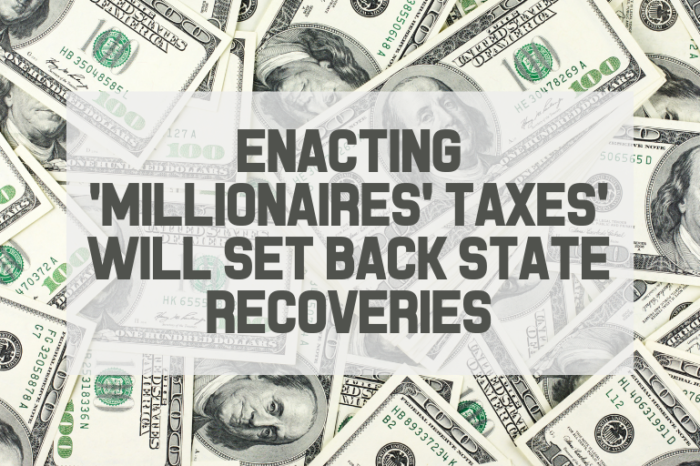Enacting ‘Millionaires’ Taxes’ Will Set Back State Recoveries
The following was originally published on RealClearPolicy.com.
After a year of living with the COVID-19 pandemic, we’re finally seeing signs of hope, as more Americans get vaccinated. While most of us may return to something approaching normal soon, it will take longer for the pandemic-ravaged economy to recover.
Even as countless citizens and businesses are struggling, many state governments are faced with large deficits that hinder their ability to help. As a result, some, such as Massachusetts, are considering raising taxes on high-earners to generate revenue. But in its report, “Connecticut’s Dangerous Game: How the Nation’s Wealthiest State Scared Off Businesses and Worsened Its Financial Crisis,” the Boston-based Pioneer Institute provides a cautionary tale about the dangers of going down the path taken by the Bay State’s neighbor, Connecticut.
Over the last quarter-century, Connecticut has endured a series of budget crises. To cover ballooning costs, the state enacted sharp tax increases, including four income-tax hikes in the last 20 years that raised the top rate by 77 percent.
In recent years, Connecticut has increasingly relied on high-earners and large companies in a desperate effort to stabilize its state budget. In addition to income-tax hikes, the state doubled a surcharge on large firms and established and then increased a tax on luxury goods.
The results have been the opposite of what state policymakers hoped. From 2008 to 2020, Connecticut ranked 49th among the states in private-sector wage growth. In recent years, Connecticut stalwarts General Electric and Alexion Pharmaceuticals moved their headquarters to Massachusetts.
The flight of jobs in turn affects homeowners. Even before COVID-19, property values in Fairfield County, home to a number of toney New York City bedroom communities and one of the wealthiest areas in the country, were 18 percent below their 2006 peak.
After all that economic misery, the tax increases have failed to stabilize Connecticut’s finances. The state continues to project large deficits.
According to 2016 Connecticut Department of Revenue Services data, the state’s wealthiest 3 percent of families account for 41 percent of all income-tax revenue. Between 2012 and 2018, Connecticut lost high-earners at a rate trailing only Washington, D.C. On average, those who fled earned more than taxpayers who migrated into the state.
As a result of the exodus, the amount of taxes paid by Connecticut’s 100 top taxpayers plummeted 45 percent between 2015 and 2016 alone, despite the tax-rate increases.
To understand that Connecticut’s problems aren’t just a result of being an older northeastern state far from booming sun belt states in the South and West, one need only look to neighboring Massachusetts, hardly an anti-tax bastion. The Bay State took a different approach in the wake of its 1990-91 recession. A state income tax that was once 6.25 percent now stands at 5 percent.
The results offer a sharp contrast with Connecticut. In recent years, Massachusetts has gained millionaires at a higher rate than the national average and nearly twice the rate of Connecticut. Between January 2008 and January 2020, employment in Massachusetts grew by 12.5 percent. In contrast, Connecticut still hasn’t recovered all the jobs it lost during the Great Recession, and those it has created are lower-paying, on average.
Wealth migration remains a concern in Massachusetts, though, which makes the state’s consideration of a so-called millionaires’ tax foolhardy. Fortunately, that would require an amendment to the state constitution to enact.
It’s no coincidence that Connecticut’s economic woes corresponded with a string of tax hikes on high-earners and businesses. The simple reality is that leaving a state has never been easier. In some cases, high-earners can physically stay put and just move money into trusts located in other states.
Connecticut’s travails in recent years, combined with the unprecedented mobility of wealth, makes it clear that millionaires’ taxes are a 20th-century solution to a 21st-century problem. Embracing them would only prolong states’ long-awaited recovery from the economic effects of COVID-19.
Jim Stergios is executive director and Charles Chieppo is senior fellow at Pioneer Institute, a Boston-based think tank.



